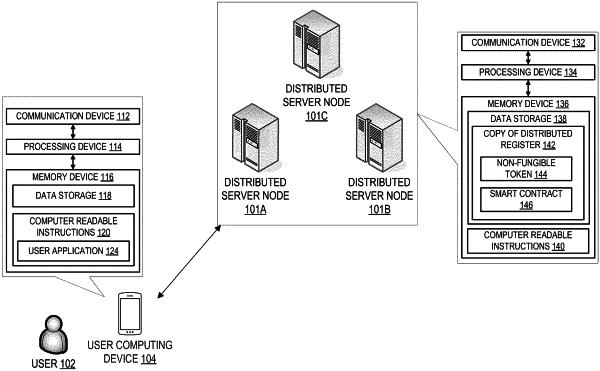| CPC H04L 9/3213 (2013.01) [H04L 9/3236 (2013.01); H04L 9/3247 (2013.01)] | 18 Claims |

|
1. A system for generation of substitutable configuration of secure distributed register tokens, the system comprising:
a memory device with computer-readable program code stored thereon;
a communication device; and
a processing device operatively coupled to the memory device and the communication device, wherein the processing device is configured to execute the computer-readable program code to:
generate a non-fungible token from a smart contract on a distributed register, wherein the smart contract comprises a custom function for generating substitute tokens based on the non-fungible token, wherein an owner ID associated with the non-fungible token is a first hash value;
receive a request to convert the non-fungible token to one or more substitute tokens;
based on receiving the request, execute the custom function of the smart contract, wherein executing the custom function comprises:
based on a token ID associated with the non-fungible token, retrieving a value associated with the non-fungible token from a value database;
generating a first set of substitute tokens, wherein a quantity of the first set of substitute tokens is based on the value associated with the non-fungible token, wherein the quantity of the first set of substitute tokens is computed by dividing the value associated with the non-fungible token by the value of one substitute token;
setting an owner ID associated with the first set of substitute tokens to the first hash value; and
based on detecting that the owner ID associated with the first set of substitute tokens has been set to the first hash value, setting the owner ID associated with the non-fungible token to a null value.
|